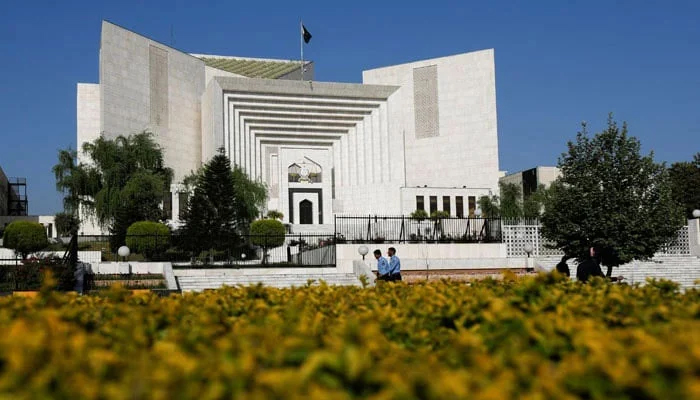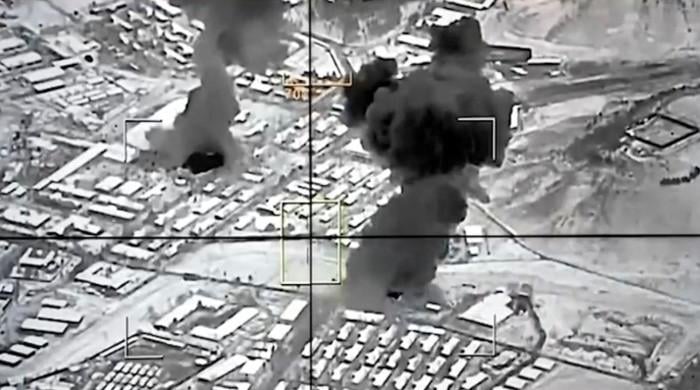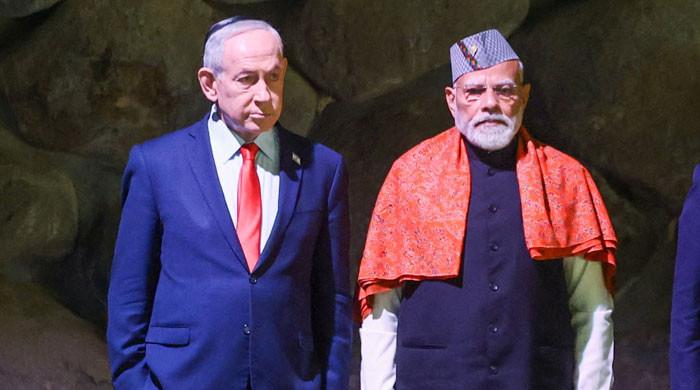Arresting accused from court premises unlawful: SC
Top court's verdict comes on Imran Khan's plea; NAB's arrest warrant declared unlawful
July 08, 2023

- Top court's verdict comes on Imran Khan's plea.
- Court declares NAB's arrest warrant unlawful.
- SC says ensuring fundemental rights of Khan.
ISLAMABAD: The Supreme Court declared Friday that arresting an accused from the high court premises would not only deny them the right to access a competent court to safeguard his fundamental right of liberty but also invite the law enforcers to treat the court premises as a hunting ground for capturing accused persons, especially when the latter seek judicial oversight of their pending arrests.
A three-member bench of the apex court, headed by Chief Justice Umar Ata Bandial, issued a detailed judgment on the petition filed by Pakistan Tehreek-e-Insaf (PTI) Chairman Imran Khan challenging the order of the Islamabad High Court that declared his arrest as lawful, The News reported.
Justice Muhammad Ali Mazhar and Justice Athar Minanallh were the two other members of the bench.
The bench on May 11, 2023 declared Khan's arrest from the IHC premises in Al Qadir Trust case illegal.
"For the reasons to be recorded later, this Misc. Application is allowed, Criminal Petition be numbered accordingly and the same is converted into appeal and disposed of in the following terms," the court had announced in its short order on May 11.
The court held that the manner of execution of the arrest warrant issued by the NAB chairman in the Al-Qadir Trust case within the premises of the IHC against the petitioner was invalid and unlawful.
The court further noted in its short order that the warrant execution violated the petitioner's right of access to justice and the sanctity and safety of the court, as he had already surrendered to the court for seeking judicial relief against the action taken by NAB in the Al-Qadir Trust case.
"In this regard, the fundamental rights of the petitioner under Articles 4, 9, 10-A and 14 of the Constitution of Islamic Republic of Pakistan have been infringed," the bench had announced.
The court had directed the petitioner — PTI Chairman Imran Khan — to appear before the IHC on Friday at 11am for the hearing of his writ petition challenging the NAB action against him in the case.
On Friday, the 22-page detailed judgment authored by CJP Bandial held that it would encourage police highhandedness and thereby expose the courts to executive machinations in the future, adding that this court could not approve such a narrow interpretation of the fundamental right of access to justice and so was categorically rejected.
The court noted that the high courts had routinely afforded the relief of protective bail to accused persons to enforce their fundamental rights of access to justice and liberty by ensuring their unobstructed access to a competent court.
"In the present case, if the petitioner's arrest from the high court's premises is endorsed, his application for pre-arrest bail filed in the AQT Case before that court will be rendered futile notwithstanding the fact that he surrendered before the high court and invoked its jurisdiction," the detailed judgment reads.
The court held that this would not only deprive the petitioner of his right to access a competent court to safeguard his fundamental right of liberty but would also invite the police officials/investigating agencies to treat the court premises as the hunting grounds for capturing accused persons, especially when the latter seek judicial oversight of their pending arrests.
"Accordingly, the petitioner's arrest from the biometric verification room of the high court is declared invalid and unlawful on the touchstone of violating his Fundamental Rights under Articles 4, 9 and 10A of the Constitution. Directions issued in the short order," the detailed judgment held.
The court noted that in the facts and circumstances of the case and to remedy the injustice that had been visited upon the petitioner, this court took the decision to reverse the clock and ordered the police to produce him before the high court so that his pre-arrest bail application in the AQT Case may be heard by the high court for decision.
"This court is of considered view that only such a course of action will caution the police officials/investigating agencies to abstain from similar conduct in future that infringes both the dignity, sanctity and safety of the courts and the fundamental right of the citizens of Pakistan to enjoy liberty in accordance with law," the court maintained.
The judgment noted that its short order declared the arrest of the petitioner invalid and unlawful for violating his fundamental right of access to justice, adding that the said right was now well-enshrined in the jurisprudence of this court and formed an integral part of Article 9 (Life and liberty of person) and Article 4 of the Constitution (Right of persons to be dealt with in accordance with the law, etc.).
"In fact, a person's fundamental right of access to justice has been strengthened by the insertion of Article 10A (Right to due process) into the Constitution by the 18th Amendment (2010)," the judgment held.
The court noted that judicial support for an accused person to have unimpeded access to the courts for seeking the relief of pre-arrest bail is recognised in the case of Niaz Mohammad (supra). However, the blocking or interruption of such access by police officers, in that case, was regarded as 'an interference with the proper working of [the] court, an unwarranted intervention in the exercise of its lawful jurisdiction and an obstruction of its process.
"Nonetheless, it may be observed with confidence that on a fair interpretation of fundamental rights, in particular the right of access to justice, it becomes clear that the protection of such rights of the people is a constitutional obligation of the courts that prevails over their duty to defend the dignity, sanctity and safety of their premises," said the detailed judgment.











